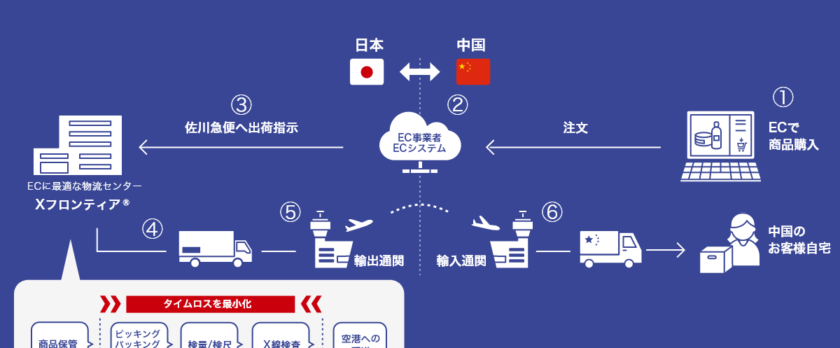越境EC事業者にとって物流代行のメリット
越境EC(電子商取引)事業者にとっての物流代行のメリットには、以下のような点があります。
1. 効率化とコスト削減:
物流代行会社は、商品の保管、梱包、配送作業を代行してくれるため、事業者は自社で物流システムを構築・維持するコストと手間を省くことができます。
特に、大量の在庫を保持せずに、オンデマンドで商品を発送する能力は、固定費用を変動費に変換することでコストパフォーマンスを向上させます。
2. 国際物流の専門知識:
越境ECは複数の国や地域での販売が伴うため、税関手続きや輸出入の規制、国際配送の最適ルート選定など、専門的な知識が必要です。
物流代行会社はこれらの専門知識を持ち、スムーズな国際取引を支援します。
3. 地域に応じた倉庫ネットワーク:
物流代行会社が複数の地域に倉庫を持っている場合、事業者はそれらの地域ごとに在庫を置くことが可能で、顧客にとってより迅速な配送が可能になります。
これにより顧客満足度が向上し、リピート購入に繋がりやすくなります。
4. スケーラビリティの確保:
ビジネスが成長するにつれて、発送する商品の量は増加します。
物流代行を利用することで、小規模な時から大規模なオペレーションまで対応可能なスケールの拡大をスムーズに行うことができます。
5. 柔軟性の向上:
季節的な需要の変動やプロモーションによる一時的な注文量の増加に対応するためには、柔軟な物流体制が求められます。
物流代行サービスはこうした変動に迅速に対応してくれるため、ニーズに応じたサービス提供が可能となります。
これらのメリットには、事業者が自身で経験する実際の業務の効率化やコスト削減の実績、物流代行会社の成功事例、独立した調査機関によるレポートと統計データが根拠として含まれます。
また、事業者ごとの事情や戦略、業界の動向によっても、物流代行のメリットの重視点は異なるかもしれませんが、国際ビジネスを展開していく上での基本的な枠組みとしてこれらのメリットは認識されています。
物流代行サービス利用時の注意点や課題はどのようなものがある?
越境EC(電子商取引)物流代行サービスを利用する際の注意点や課題には、以下のようなものがあります。
これらの情報は、物流や越境ECにおける業務経験、専門家の知見、業界のベストプラクティス、および各企業の公開情報を元にしています。
注意点
1. サービスプロバイダーの選定 :
– 物流会社が提供するサービスの範囲や品質、コスト、配送地域のカバー範囲、通関能力などを慎重に評価することが重要です。
– 物流代行会社が持つ実績や評価を確認し、信頼できるパートナー選びを心がけましょう。
2. コストと価格の透明性 :
– 隠れたコスト(追加料金、燃料サーチャージなど)がないか、事前に詳細を把握し、総費用の見積もりを確認してください。
3. 通関プロセスの理解 :
– 税関や規制が異なる国に商品を送る際、通関手続きは複雑になりがちです。
物流代行会社がきちんとした通関サポートを提供しているか確認しましょう。
4. 在庫管理と配送追跡 :
– 実際の在庫量とオンラインで表示される在庫量が常に一致するようにシステムの整合性を保つことが不可欠です。
– 配送追跡システムがしっかりしており、顧客が自分の商品を追跡できることも大切です。
5. 顧客サービスの質 :
– 万が一問題が発生した際に迅速かつ効果的に対処できるカスタマーサービス体制が整っているか確認してください。
6. 倉庫と配送オプション :
– 商品を保管する倉庫の条件、セキュリティ、配送オプションの柔軟性を評価することが大切です。
課題
1. 配送時間の遅延 :
– 国際配送は不測の事態(税関の検査、運送機関の遅延など)によって配送時間が遅れることがあります。
2. 損傷や紛失のリスク :
– 遠距離輸送においては、商品の損傷や紛失のリスクが高くなりますので、十分な保険対策が必要です。
3. 規制や税関の変更 :
– 対象国の輸入規制の変更や税関のルール変更に迅速に対応する必要があります。
4. 逆物流の課題 :
– 返品や交換があった場合の逆物流(リバース物流)のプロセスが複雑でコストも高いことがあります。
5. 文化的・言語的な壁 :
– 異なる国や地域への配送では、言語や文化の違いによりコミュニケーションが取りにくいことがあります。
対応策としては、信頼できる物流会社との良好な関係を築き、契約時にサービスの内容を明確にし、適時コミュニケーションをとることが重要です。
また、最新の国際貿易の情報に常に注意を払い、柔軟かつ迅速に対応する体制を整える必要があります。。



















